August eNews
CSO-Media Round Table Meet
BCMD and RENEW jointly organised the CSO–Media Engagement Forum on 14 August 2025 in Thimphu. The event convened 51 participants, including representatives from civil society organisations, the media, development partners, and officials from the CSO Authority Secretariat. Centred on the theme “Fostering Media–CSO Synergy for People-Centred Development and Democratic Engagement,” the forum served as a platform for open dialogue, mutual learning, and collective reflection on the evolving engagement between the two sectors.
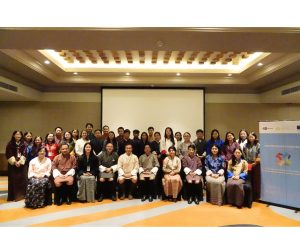
The Journalist Association of Bhutan presented key findings from two nationwide studies examining Bhutan’s media landscape and public perceptions of the press. The results underscored pressing challenges to press freedom, transparency, and media sustainability, alongside strategic recommendations to foster an inclusive, trusted, and resilient media sector. The CSO Authority (CSOA) Secretariat also provided an overview of the regulatory frameworks and institutional mechanisms currently in place to uphold accountability and integrity within the CSO sector, including an overview of the Bhutan Civil Society Accountability Standards (BCAS). Respect, Educate Nurture & Empower Women (RENEW Plus) introduced the draft CSO–Media Engagement Strategy which aims to enhance collaboration, mutual understanding and strategic partnership between the two sectors.
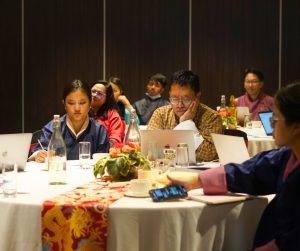
A focussed round table discussion, moderated by Mr. Needrup Zangpo, examined the current state and challenges of engagement between the CSOs and media. The conversation delved into strategies to advance human-centred storytelling through the work of CSOs, promote responsible advocacy, and identify opportunities for joint initiatives that support transparency, accountability, and inclusive development. Participants from both sectors reaffirmed their commitment to strengthening collaboration and open dialogue, recognising their shared role and responsibility in shaping Bhutan’s development narrative and contributing to its socio-economic progress and values-based growth within a democratic framework.
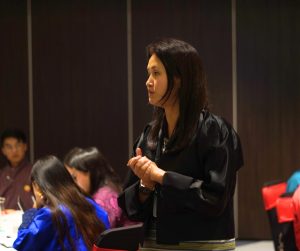
The forum was organised by DW Akademie Asia and BCMD in partnership with Save the Children Bhutan and RENEW Plus, with financial support from the European Union (EU). The organisers also extend appreciation to the Journalist Association of Bhutan and the Bhutan Media Foundation for their partnership and support in helping shape the format and discussion at the forum.
The Druk Journal Conversation
The second Suja and Dzaw Conversation for the 21st edition of The Druk Journal on “Climate Change in Bhutan: Impact and Responses” was held on 15th August 2025 at Sherubtse College, Kanglung. The conversation brought together over 120 participants, including former Members of Parliament, students, teachers, lecturers, and local officials, to reflect on the urgent realities of climate change in Bhutan and the country’s responses.
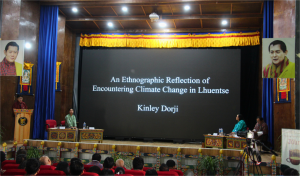
The dialogue was enriched by four contributors to the edition: Sonam P. Wangdi, Former Secretary of the National Environment Commission; Sonam Choden, Lead Research Coordinator at ReBuilt Bhutan; Pema Eden, a Ph.D. candidate at the College of Natural Resources; and Kinley Dorji, Lecturer at Royal Thimphu College. The speakers underscored Bhutan’s active role in global climate negotiations, while pointing out the inadequacy of climate finance and the growing risks posed by glacial melt, drying springs, and floods. Despite the abundance of rivers, the country faces mounting water insecurity, highlighting the need for stronger governance and public awareness of water as a finite resource.
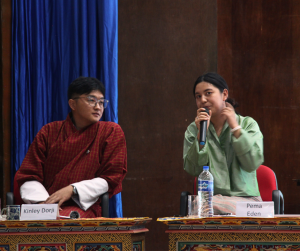
Much of the conversation centred on the cryosphere and the cascading effects of glacier retreat, permafrost thaw, and glacial lake outbursts on ecosystems and livelihoods. The speakers emphasised the importance of reliable scientific data and effective communication to strengthen public understanding. From an ethnographic perspective, climate change was also shown to disrupt traditions, sacred cycles, and community practices, reminding participants of the value of cultural wisdom and storytelling in shaping resilience and adaptation. As one forestry personnel in the audience reflected, “We did learn about climate change from a very young age in school, but through this conversation we learnt how spiritually local peoples are affected, and how they think of climate change. We usually think of climate change in terms of temperature rise, but here we discussed how it impacts water and glaciers. In the short term, melting glaciers may benefit hydropower, but in the long term, sustainability will be very hard. As forestry personnel, we are doing everything we can to increase forest coverage and enhance carbon sequestration to contribute positively to climate change.”
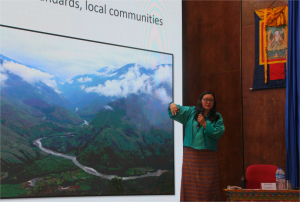
The conversation concluded with a shared understanding that Bhutan’s climate response requires stronger adaptation strategies in water management, agriculture, and disaster preparedness. Integrated resource management, improved governance, and youth education were identified as key priorities, alongside the need to cultivate mindful consumption and ethical decision-making. The discussion made clear that collaboration among scientists, policymakers, and communities is not only desirable but essential if Bhutan is to respond effectively to the profound challenges of climate change.
Stakeholder Consultation Meeting on Strengthening Child Protection Mechanisms in Bhutan
On 26th August 2025, the Bhutan Centre for Media and Democracy in collaboration with the National Commission for Women and Children (NCWC) convened a national Stakeholder Consultation on Strengthening Child Protection Mechanisms in Bhutan. The consultation brought together a diverse group of stakeholders from government agencies, CSOs, the judiciary, law enforcement and the media, to deliberate on actionable solutions. This consultation was organised in response to the growing need for stronger, more coordinated, and preventative approaches to safeguarding children’s rights and wellbeing.

Building on the existing legal and institutional frameworks, The Stakeholder Consultation looked at the opportunity to further strengthen child protection by enhancing inter-agency coordination, increasing public awareness, improving resource allocation, and proactively addressing emerging risks such as online safety, grooming, and data management gaps.
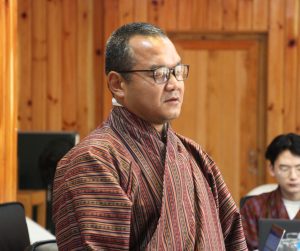
Key discussions focused on:
• Reviewing existing laws, policies, and their implementation gaps
• Exploring a potential vetting and information-sharing system to strengthen institutional safeguard
• Enhancing the role of media and communication in advocacy, transparency, and public education
Participants also emphasised the need to address rural vulnerabilities, strengthen legal literacy, improve coordination among service providers, and reinforce social protection measures in the 13th Five-Year Plan. The consultation concluded with a shared commitment to enhance collaboration, improve monitoring and evaluation mechanisms, and advance civic awareness as a key tool to prevent harm and ensure every child in Bhutan grows up safe, supported, and protected.
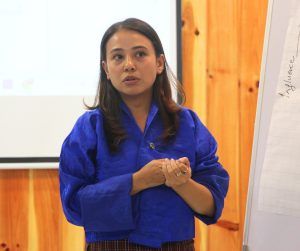
The Centre would like to express heartfelt gratitude to the Australian Government, Department of Foreign Affairs and Trade for their generous funding support, which made this important consultation possible.
